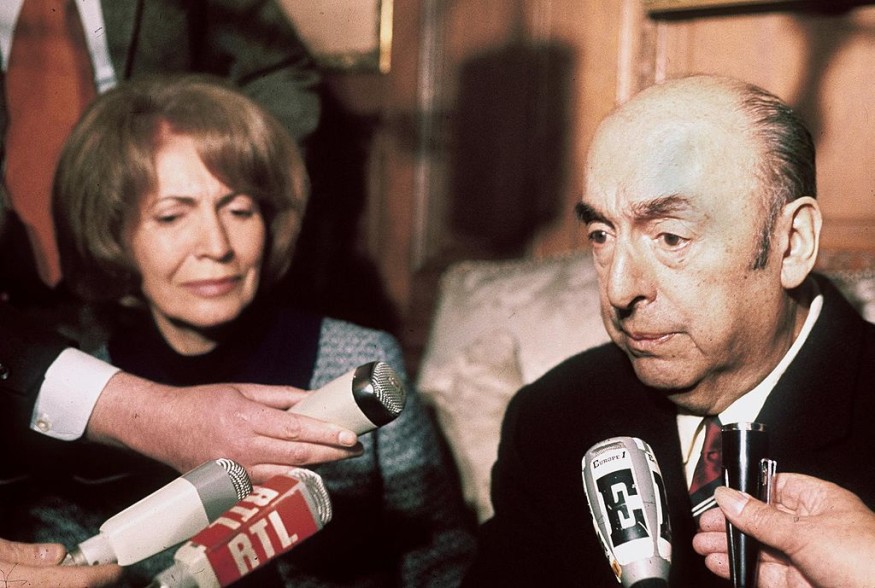Pablo Neruda's Cause of Death 50 Years Ago, Revealed

Chilean poet and Nobel laureate Pablo Neruda's cause of death is poisoning, as revealed by a recent assessment from forensic specialists.
Almost five decades have passed since the famous poet died. Officially, Neruda died of prostate cancer, although his family had always disputed this because he died shortly before dictator Augusto Pinochet came to power.
Pablo Neruda's dead body was exhumed ten years ago following a court order, and an examination conducted in 2017 revealed botulism residue in one of his molars. The body was thoroughly checked to see if the poison had been added before burial.
The family of Pablo Neruda claims that forensic tests conducted by a group of experts from Canada, Denmark, and Chile revealed the presence of Clostridium botulinum, a toxin capable of causing paralysis in the nervous system and death.
The toxic substance was reportedly present in his system before his death.
A judge in Chile received the report on Wednesday but has yet to publicize its contents.
Judge Paola Plaza has stated that she will analyze the documents and make further decisions on March 7.
Meanwhile, who had Pablo Neruda poisoned remains unknown.
RED NEXT : Pablo Neruda Poems 2014
Pablo Neruda's Cause of Death Analyzed
Neruda, then 69 years old and suffering from prostate cancer, was hospitalized on the day of the Pinochet coup on September 11, 1973, Common Dreams says.
The poet planned his exile to Mexico, where he had been Chile's consul general in the 1940s, while he was in the hospital getting treatment.
Neruda would undoubtedly have been a vocal opponent of the right-wing dictator and a major thorn in the regime's side. He was a close friend of Salvador Allende, the democratically elected socialist president who was overthrown by Pinochet's forces with the support of the U.S. military, intelligence, and business organizations.
Manuel Araya, Neruda's driver and bodyguard, has long claimed that a distraught Neruda called him from the hospital and spoke of being shot in the stomach while he was sleeping.
Neruda left the hospital on September 23 because he feared the worst. He died a few hours later.
Prostate cancer's debilitating effects were reported as his official cause of death.
Gonzalo Martnez Corbalá, the Mexican ambassador to Chile at the time of the revolution, claimed to have seen Neruda two days before his passing and that, despite being ill, he weighed 220 pounds, contradicting official assertions that Pablo Neruda's cause of death was cancer's wasting effect.
The Chile government announced in 2015 that it was "highly probable that a third party" was involved in Pablo Neruda's death, following a court-ordered exhumation and investigation of his bones that began in 2013 and involved forensic specialists in four nations.
A group of scientists from around the world stated they were "100% certain" in 2017 that Pablo Neruda's cause of death was not cancer.
Pablo Neruda Was Flawed but Still a Great Poet
Gabriel Garcia Márquez, Neruda's companion, once called him "the greatest poet of the 20th century in any language." However, revelations about Neruda's private life have damaged his image recently. The author, who admitted to being a rapist, also deserted his first wife and their daughter Malva Marina, who was born with a neurological condition and passed away at nine.
After his death, Neruda's memoirs were published under the title Confieso Que He Vivido (I Confess That I Have Lived), in which he admitted to raping a Tamil woman who was his servant during his time as a young diplomat stationed in Ceylon.
He went on to say, "She was right to despise me" after detailing the rape, per The Guardian.
Human rights campaigners opposed renaming Santiago Airport after the poet when his rape confession resurfaced over five years ago.
Isabel Allende, then a writer and advocate for women's rights, told the Guardian that Neruda's immoral and cruel actions did not diminish the value of his work.
"I am disgusted by some aspects of Neruda's life and personality," she said. "However, we cannot dismiss his writing. Very few people - especially powerful or influential men - behave admirably. Unfortunately, Neruda was a flawed person, as we all are in one way or another."
Read also: Mexico: 6 Bodies Dumped on Side of Road
This article is owned by Latin Post.
Written by: Bert Hoover
WATCH: Romance and revolution: The poetry of Pablo Neruda - Ilan Stavans - From TED-Ed
Subscribe to Latin Post!
Sign up for our free newsletter for the Latest coverage!

















